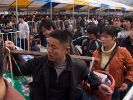Eye For Film >> Movies >> Last Train Home (2009) Film Review
The impact of the ongoing industrial revolution in China has proved a rich seam for filmmakers. With the problems this rapid embrace of capitalist models within a communist framework is causing within communities and families being explored in both fiction (Fish Eyes), documentary (Up The Yangtze, Manufactured Landscapes) and blends of the two (24 City).
Debut director Lixin Fan is no stranger to the subject matter, having worked as a translator and sound recordist on Yung Chang's Up The Yangtze, which explored the flooding of the river for the Three Gorges Dam project and its consequences for one family. Here he takes a look at the 'machine' of Chinese migrant working life from the very personal perspective of a single family.

The title is a reference to the yearly pilgrimage made by the country's millions of migrant workers, back to their families to share Chinese New Year. This is, for many, the only time that parents get to spend with their children - who are generally left at home under the care of grandparents - meaning that the desire to make the journey reaches levels of near-hysteria if tickets cannot be acquired. But if there is chaos at train stations up and down the land, it is nothing compared to the emotional turmoil experienced by families who find this enforced separation makes them little more than strangers to their own flesh and blood.
Fan focuses on the impact on the Zhangs, a man and wife who have, for years, left their son and daughter under the care of their grandparents in rural China, so they can work in a clothing factory, with the aim being to ensure their kids get the education they didn't and can, in doing so, be spared the same fate. Inevitably the prospect of seeing their children after a such a huge gap means anticipation reaches fever pitch and, in fact, takes on an almost mythical status in the parents' imaginings that, even in the most ideal of worlds, is unlikely to be realised. Once at home, however, they are greeted not with the open arms and tidal wave of love they might expect but a full year's worth of pent up teenage frustrations from their daugther Qin who, like teens the world over, sees the world from her own limited perspective and has little grasp of their notion of 'sacrifice' for her betterment.
Fan finds power in contrast, from the striking melee of the station where almost an entire city waits hours for a ride home and the stoic images of multitudes of workers crammed on a train, to the intimacy of a family where, through the direct fault of no one, patience is about to snap. On the one hand this is a very personal tale of one family's struggle to make the best of trying circumstances, on the other it is a stinging indictment on a political and economic structure that is stretching families to breaking point.
Although standing in the shadow of Up The Yangtze somewhat due to the similarity of some of the subject matter and a little overlong, this is nevertheless a striking and thought-provoking debut that puts a very personal face on a phenomenon that, Fan hints, could well be tearing Chinese society apart from within.
Reviewed on: 19 Mar 2010


















